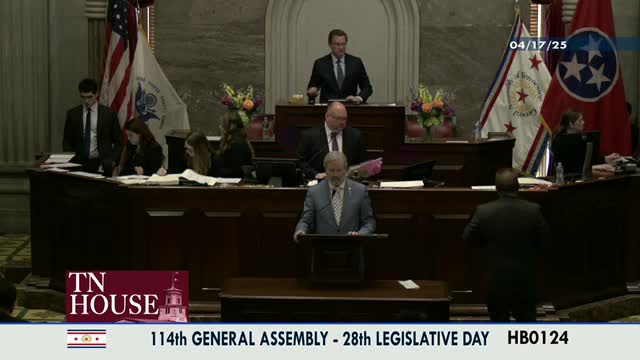House approves bill to create state coal-ash permit program; sponsors say it keeps regulation local
Get AI-powered insights, summaries, and transcripts
Subscribe
Summary
The Tennessee House passed Senate Bill 1274, a measure sponsors say will let the state create a coal combustion residual (CCR) landfill permitting program and recover costs for CCR activities. Sponsors framed the change as a way to keep oversight at the state level rather than under direct federal control.
The Tennessee House passed Senate Bill 1274 on third reading after floor debate focused on how Tennessee should regulate coal combustion residuals (coal ash) and who should have permitting authority.
Chairman David Todd, speaking as the bill sponsor on the House floor, said the measure “modernizes some things for our Department of Environment and Conservation,” including updating cap fees in the non–Title V air permitting program and removing the CCR landfill permit program from the environmental protection fund structure so the department can “authorize cost recovery for activities related to coal combustion residual disposal units.” He also said the bill would “modify the prohibition of the disposal of coal ash in an online facility to allow TDEC to permit and regulate these online CCR disposal units.”
Representative Jeremy Pearson raised concerns about communities in his district, citing the Tennessee Valley Authority’s coal ash ponds and the historical Kingston spill. Pearson asked why CCR disposal units were removed from the existing oversight structure and whether the bill would weaken EPA oversight or state protections. He said constituents in affected areas want strong enforcement and oversight.
Todd replied the bill establishes a framework for TDEC to develop a state coal combustion residual landfill permit program that can be submitted to the U.S. Environmental Protection Agency for approval. Todd said the intent was to keep regulation and enforcement in Tennessee, noting in floor remarks that “we would much prefer our own department to deal with our citizens rather than have federal folks in our backyards.”
Supporters argued state-level authority will allow Tennesseans to press local regulators directly when problems arise; opponents warned of potential gaps in federal oversight. The sponsor and backers said the bill meets or exceeds EPA minimum standards and will allow the state to recover permitting costs and streamline operations within the Division of Mineral and Geologic Resources.
Outcome: The bill received a favorable vote on the House floor and was reported as passed; the clerk announced the matter as carried on third reading and ordered to the appropriate next step. The floor transcript included debate and questions from members; a clerk’s roll-call readout was announced, though the transcript excerpt does not include a clear, unambiguous roll-call tally in the provided excerpt.
Why it matters: Senators and representatives said the measure is intended to ensure state-level responsiveness to local complaints about CCR disposal and to create a regulatory mechanism to handle permitting and cost recovery. The agency that would implement the program is the Tennessee Department of Environment and Conservation (TDEC); the program would be developed in line with federal EPA requirements and would require EPA approval to operate as the state program.
What’s next: If TDEC develops the permit program under the statute, it will need to submit rules or a program to EPA for approval and begin implementation and cost-recovery procedures as allowed by the law.
